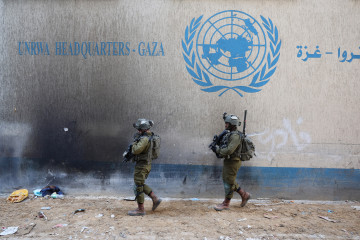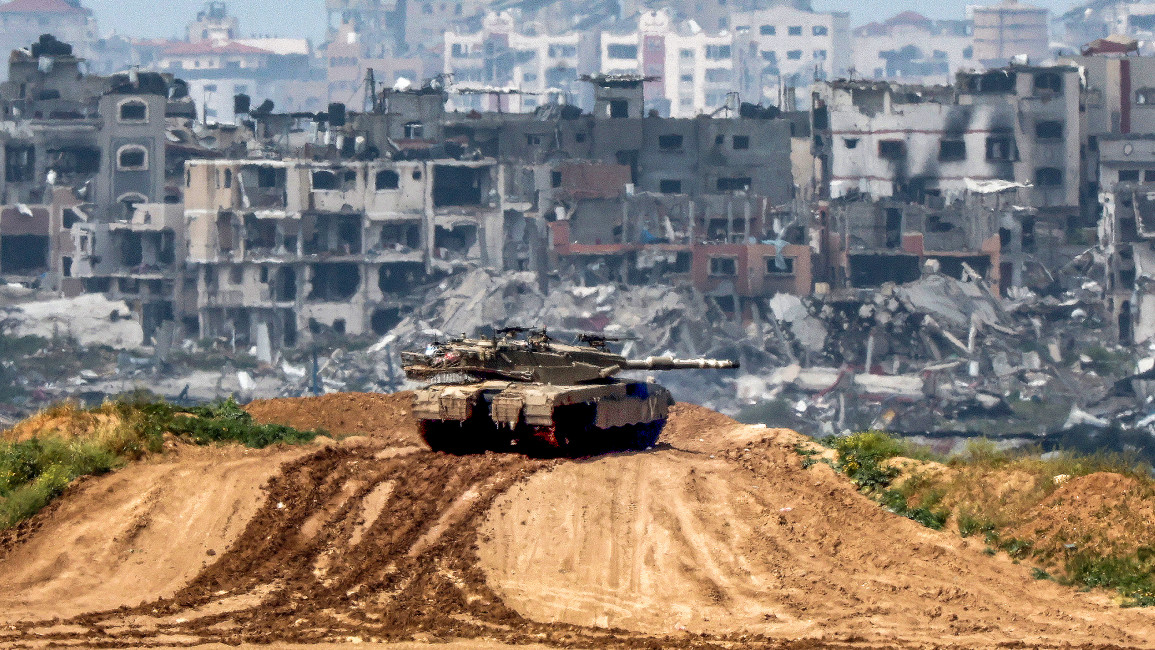

Israel officially notified the United Nations on Monday of its decision to cut ties with the agency for Palestinian refugees, UNRWA, after adopting two bills last week banning its operations.
The new legislation will take effect in 90 days and the UN has warned of devastating consequences for the humanitarian situation in Gaza, where it is the largest aid provider amid famine-threshold levels of malnutrition.
Experts interviewed by The New Arab say that Israel’s ban on UNRWA is a political act against the organisation amid a wider battle with the international community and its institutions.
Following Hamas’s attack on 7 October and the subsequent war on Gaza, which has killed more than 43,000 people and devastated the entire territory, Israel has intensified its political attacks against UNRWA, which provides humanitarian services to 5.9 million registered Palestinian refugees across the occupied territories and Jordan, Syria, and Lebanon.
Tensions peaked in January 2024 when more than a dozen countries, including the United States and some European countries, announced a suspension of funding to UNRWA following Israeli allegations that some of its staff were involved in the 7 October attacks.
Israel provided no evidence when linking UNRWA staff to Hamas, according to a report by an Independent Review Group led by former French foreign minister Catherine Colonna. Nevertheless, the UN reported in August that nine UNRWA employees "may have been involved" in the attack and have since been fired.
But Israel hasn’t limited its attacks on the UN just to UNRWA. Since its war on Lebanon began, Israeli forces have repeatedly targeted the United Nations Interim Force in Lebanon (UNIFIL), including through military attacks, the latest of which injured eight Austrian soldiers in Naqoura last week.
Israel’s Prime Minister Benjamin Netanyahu has said UNIFIL was providing a "human shield to Hezbollah terrorists" while other Israeli officials have called the UN peacekeeping force “useless” and labelled the UN a “failed organisation”.
Since launching its war on Gaza, and more recently in Lebanon, Israel has faced global criticism amid numerous UN resolutions condemning its actions in the region.
The International Criminal Court (ICC) Prosecutor, Karim Khan KC, has applied to the court for arrest warrants for senior Israel leaders, including Netanyahu and Defence Minister Yoav Gallant for war crimes, while the International Court of Justice (ICJ), has found it “plausible” that Israel has committed acts that violate the Genocide Convention.
|
|
In May, the ICJ, the UN’s top court, ruled that Israel should cease its military operation in Rafah, while in July it ruled that Israel's occupation of the Palestinian territories is a violation of international law.
Despite these rulings, Israel has continued its military campaigns, with the US using its veto power in the UN Security Council multiple times to protect its ally.
In response to mounting UN pressure, Israel has launched a series of political actions against the organisation that could put at risk the global body’s already fragile authority while also setting dangerous precedents.
Merissa Khurma, program director of the Middle East Program at the Wilson Center, told The New Arab that the wars in Gaza and Lebanon have widened the gap between Israel and the UN.
"For Israelis, UNRWA is highly political, viewed through a security lens rather than a humanitarian one. Its mandate is tied to Resolution 194, which upholds the right of return and maintains Palestinian refugee status, which acknowledges the conflict and implies a place of return, making this UN agency a sensitive issue for Israelis," she said.
UNRWA also symbolises the suffering of Palestinian refugees since 1948, Middle East expert Rafe Jabari told TNA, providing essential services and maintaining records that support their right of return.
"Its elimination is seen as an attempt to erase the refugee narrative," he said.
Israel’s conflict with the UN, however, has deep roots, even though, paradoxically, the Israeli state only exists as a result of the 1947 UN partition plan based on Resolution 181, which assigned 57% of the Mandate of Palestine for a Jewish state despite the fact that Palestinians owned 94% of the land.
Since 1947, the UN has passed hundreds of resolutions criticising Israel’s actions. These include Resolution 194, affirming the right of return for Palestinian refugees, Resolution 3236, recognising the right of Palestinians to self-determination, Resolution 1397, which calls for a two-state solution, and multiple others condemning illegal settlement building and other violations of international law.
Saul J. Takahashi, professor of Human Rights and Peace Studies at Osaka Jogakuin University and former deputy head of the Office of the UN High Commissioner for Human Rights in Palestine from 2009 to 2014, told TNA that Israel-UN ties have deteriorated over the years as more countries sympathetic to the Palestinian cause joined the UN from the 1970s onward.
A major recent turning point was the 2009 Goldstone Report, which accused Israel of war crimes during Operation Cast Lead and engendered a furious counterattack.
"Israel's ban on UNRWA is the accumulation of those decades of impunity where Israel has not been held to account," he said.
Instead, Israel has increasingly targeted the UN’s authority, particularly during its wars in Gaza and Lebanon, including directly against key UN personnel.
|
|
Israel's UN representative Gilad Erdan has made several inflammatory remarks, including calling for its Jerusalem headquarters to be "erased from the face of the earth" and condemning the ICJ’s advisory opinion on Israeli actions in the occupied West Bank as "distorted" and part of a biased trend against Israel.
More recently, Netanyahu described the UN as a "swamp of antisemitic bile" at the September General Assembly (GA), while Foreign Minister Israel Katz declared UN Secretary-General António Guterres "persona non grata" because he didn't specifically condemn Iran's missile attack on Israel.
An investigation earlier this year by The Guardian revealed that Israel has targeted the International Criminal Court (ICC) and its personnel to undermine war crimes investigations, including an alleged intimidation campaign against ex-ICC prosecutor Fatou Bensouda by former Mossad chief Yossi Cohen to drop her investigation into Israeli violations in Palestine.
Karim Khan, Bensouda's successor, has sought arrest warrants for Israeli and Hamas leaders amid the ongoing conflict and has pledged to combat the intimidation of ICC officials.
A criminal complaint in the Netherlands filed on behalf of twenty Palestinians has alleged the harassment and intimidation of ICC staff, citing reported threats from Israeli officials and pressure from US Senators directed at Khan, who is currently facing new allegations of misconduct towards a woman who previously reported to him.
He has denied the accusations and requested an "immediate investigation" while pledging to "cooperate fully" with the inquiry.
Jabari explained that attacks and pressure on key UN figures are a political threat, targeting both the individuals and the organisation itself.
"The message is: anyone who voices against Israeli policies will be targeted," he said.
Asked about Israel's goal in targeting key UN figures, Khurma explained that "their goal is a reflection of a new Israeli mindset after the 7 October attack. And it's a mindset [where] there is not any room for dialogue or discussion”.
Israel's actions in the Middle East and targeting of the UN have prompted Palestinian civil society and members of international civil society to push for Israel's suspension or expulsion from the UN.
Under Article 6 of the UN Charter, member states can be expelled for persistently failing in their obligations, but this requires Security Council approval, often blocked by US vetoes, Takahashi said.
He explained that in 1974 when vetoes prevented South Africa's expulsion over apartheid, the General Assembly instead used its Credentials Committee, which is responsible for validating the representation of member states, to reject South Africa's representation, creating a "de facto" exclusion.
South Africa remained a UN member in name but was largely barred from participating in the General Assembly until the end of apartheid in the early 1990s.
Some now argue that Israel's defiance of UN resolutions, actions against UN personnel, and occupation policies could justify a similar approach, raising support for alternative exclusion methods.
"Israel has operated with a level of impunity largely unmatched since the post-war era, a double standard that recent events in Gaza have intensified - especially in contrast to Western nations' stance on the Ukraine war, which many globally now find intolerable," Takahashi said.
Politically, Khurma stated that the war in Gaza has severely damaged Israel's international reputation. While international observers focus on civilian suffering, Israeli media primarily highlights military actions, limiting awareness within Israel.
"There's a gap between what the Israeli public perceives and what the international community sees, contributing to the problem and isolating Israel further in its dynamic with the UN," she said.
Israel's deteriorating relations with the UN are currently focused on UNRWA, with Jabari noting that Israel aims to control organisations that report on its actions.
UNRWA's independence is particularly troubling for Israel, especially as it highlights issues the government prefers to downplay, such as the death toll of 43,000 Palestinians in Gaza, including 17,000 children, and the humanitarian crisis its policies have created.
More broadly, Jabari emphasised that Israel's actions represent opinion policing, targeting dissenters who condemn Israeli actions.
"These delegitimisation efforts act as propaganda to undermine the credibility of UNRWA and its key figures," he said.
Dario Sabaghi is a freelance journalist interested in human rights.
Follow him on Twitter: @DarioSabaghi
![UNRWA [Getty]](/sites/default/files/styles/large_16_9/public/1998846129.jpeg?h=52bad4fe&itok=y6hGfry4)




 Follow the Middle East's top stories in English at The New Arab on Google News
Follow the Middle East's top stories in English at The New Arab on Google News


